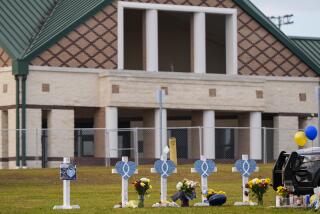In James Holmes trial, bereaved mother speaks, and prosecution rests

She thought it was a prank — the explosion just fireworks, the hissing some kind of a stink bomb. But Ashley Moser wanted to get out of the packed theater anyway, to protect the unborn child inside of her, to herd her 6-year-old daughter, Veronica Moser-Sullivan, to safety.
“I went to stand up, to reach for her hand, to try to exit,” Moser said Friday from the witness stand, the first time she has spoken publicly about that night. “I felt it slip through my hand. As soon as I stood up, I remember getting hit in the chest. I remember falling on top of her.”
“Did you feel her moving?” Arapahoe County Dist. Atty. George H. Brauchler asked.
“No,” Moser said, the word hollow with anguish.
The nation’s attention may be focused on the latest horrible act of gun violence 1,700 miles away in South Carolina, but here in the Denver suburbs, an earlier mass shooting reached a trial milestone Friday. The prosecution rested in People vs. James Eagen Holmes, and jurors filed out with Moser’s testimony ringing in their ears.
The 27-year-old gunman has acknowledged killing 12 moviegoers and wounding 70 others nearly three years ago. He has pleaded not guilty by reason of insanity.
Brauchler: “Did you feel her breathing?”
Moser, louder: “No.”
Brauchler: “Could you get off of her?”
Moser, in tears: “No.” She paused, biting her lip. “I tried but I couldn’t move.”
Moser was in Theater 9 of the Century 16 multiplex in Aurora, Colo., when Holmes burst in, guns blazing. She was pregnant and had just undergone her first ultrasound earlier that day. She took Veronica to see “The Dark Knight Rises” to celebrate the new baby. She thought it was “going to be a family movie.”
Today, Moser is paralyzed from the waist down. One of Holmes’ bullets tore through her back and lodged in her spine. Surgery to save her life caused her to lose the child she was carrying. Veronica was one of the 12 dead, shot four times. Moser was one of the 70 wounded.
If a single person could capture the immensity of loss and pain and grief Holmes wrought on July 20, 2012, it is Moser. On Friday, she rolled into Division 201 of the Arapahoe County Justice Center in an electric wheelchair. She clutched a tissue in her left hand. And she talked about the seven bullets that changed her life forever.
“I got shot three times, one in my thigh and two times in my back,” she said. “One went all the way through my chest. The other one ricocheted off my shoulder blade and went into my spine.”
Moser spent four months in the hospital. She had to learn to use a spoon again, to make a sandwich, sit upright, dress herself. She regained the use of her arms. She will never walk again.
As Moser finished testifying, prosecutors flashed a picture of Veronica on the three flat screens in Division 201. Three seconds was all Judge Carlos A. Samour Jr. would allow, lest the dead child’s smile prejudice the jury. It was her kindergarten graduation photo, and the little girl with the sandy hair gripped a pencil in her left hand and grinned.
Earlier in the week, defense attorney Tamara Brady had listed all the things she wanted excluded from Moser’s story and the evidence of her loss. High among them was a photo of Holmes’ youngest victim.
The prosecution wanted the picture shown, Brady argued, just “so that Ashley will start crying. There is no relevance” to the case, the 166 charges against the gunman, the possible death sentence, the attorney said.
Samour allowed the brief glimpse. Moser cried.
She wasn’t the only one.
Moser was 25 when Holmes stepped through the exit door of the multiplex, armed with an assault weapon, a rifle, a shotgun, a handgun and a delusion — that killing as many people as possible would make him feel better. Her loss has woven its way through the lengthy trial like a dark thread since day one, when Brauchler played a snippet of surveillance video from the theater.
There was Veronica, pretty in pink in the grainy video, strolling past the concession stand holding someone’s hand. She was wearing sparkly sandals, a gift from her baby-sitter, and tiny earrings. She was headed for first grade in the fall. She was going to be a big sister.
“You’re a big girl, and you can sit on your own seat.”
That’s the last thing Moser said to her first, last and only child.
Moser is the third victim of the Aurora shooting to testify from a wheelchair placed beside the witness box.
On the first day of testimony in late April, Caleb Medley, who cannot walk or talk, was wheeled up by his father. Medley testified by pointing to letters on an alphabet board. An interpreter read out his answers, slowly and painstakingly.
Prosecutor Lisa Teesch-Maguire: “Did you go to the Century 16 movie theater on July 20, 2012?”
Medley tapped, and the interpreter read: “Y.” A pause. “E.” Pause. “S.”
Stefan Moton, an aspiring martial arts fighter, used mouth controls to pilot his electric wheelchair to the front of the courtroom. He was 18 when Holmes’ bullets severed his spine. He woke up in the hospital two days later, paralyzed from the chest down. When he testified May 27, his hands lay motionless in his lap.
By the time the prosecution rested its case on Friday, day 35 of the months-long trial, jurors had heard from more than 200 witnesses, viewed hours of video, leafed through hundreds of pages of documents, seen hundreds of gruesome photographs — gaping wounds, dead bodies.
The pool of jurors and alternates had shrunk to 19 from 24. Juror 901, whose brother-in-law was the victim of a random shooting mid-trial, was dismissed because Samour worried she could not be impartial. On Thursday and Friday, she was back in the courtroom, watching from the audience, working Sudoku puzzles during breaks.
Next week, the defense will begin presenting its case.
Although the prosecution must prove Holmes was sane at the time of the rampage, his attorneys are expected to spend two weeks demonstrating that he was “floridly psychotic.”
Craig Silverman, a former chief deputy district attorney in Denver, said the task facing Holmes’ public defenders is formidable.
“They just have to get one foot over that mountain of evidence that the prosecution has built,” he said. “That could be tough.”
Twitter: @marialaganga
More to Read
Sign up for Essential California
The most important California stories and recommendations in your inbox every morning.
You may occasionally receive promotional content from the Los Angeles Times.











